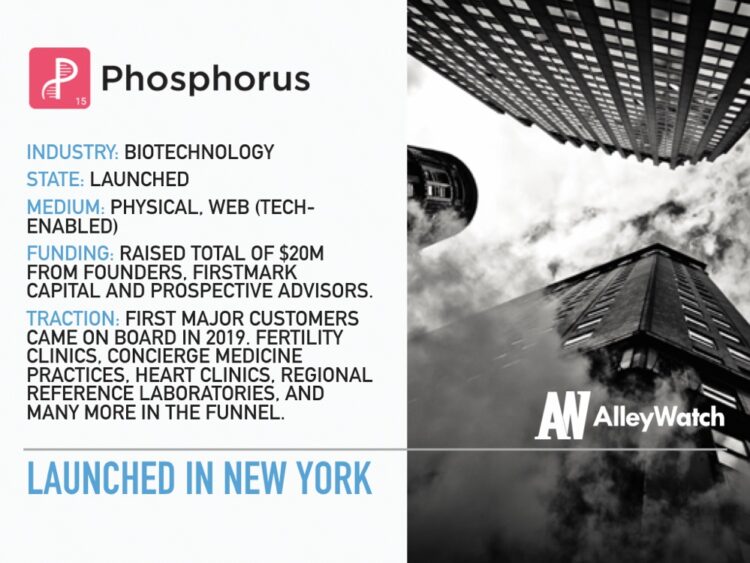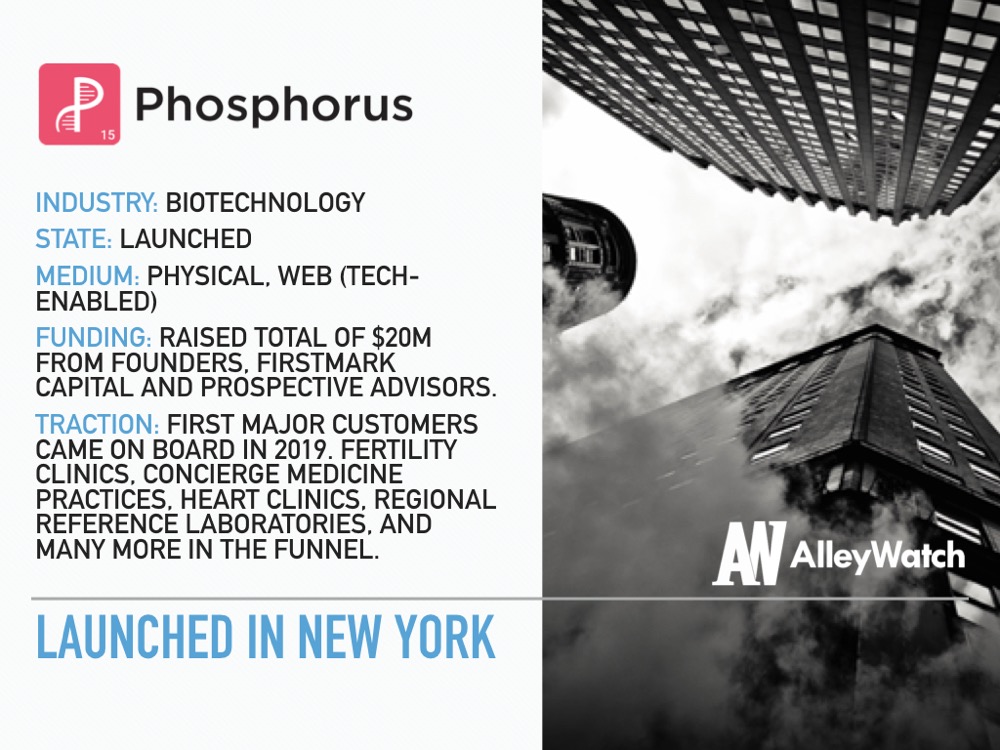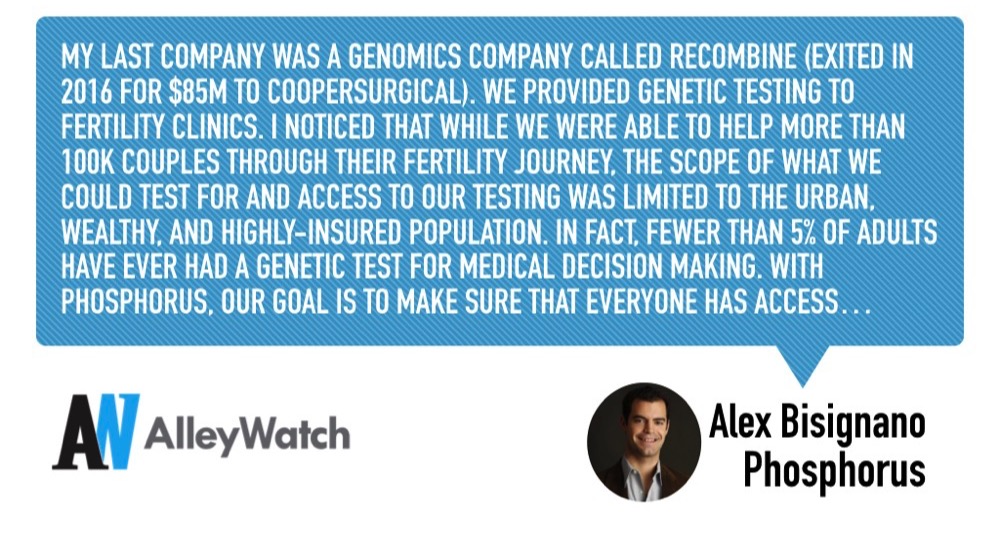The average adult takes more than four medications and many of these medications are used to control issues originating from genetics. Phosphorus is the DNA testing platform that wants to revolutionize healthcare by encouraging people to take genetic tests well before they potentially get sick. The company’s flagship product, PhosphorusOne, is an at-home genetic test using a saliva sample. The sample is then sent to the lab where scientists extract and sequence your DNA, to detect diseases that are caused by multiple genes including the eighty-three genes that lead to a variety of inherited cancers and the one hundred fifteen genes that are known to cause cardiovascular disease.
AlleyWatch sat down with Alex Bisignano to learn more about creating an accessible and affordable genetic test to improve healthcare and the company’s future plans.
Tell us about the product or service that Phosphorus offers.
Phosphorus is pioneering the use of DNA testing for preventive medicine to transform healthcare. We help customers stay healthy by understanding their genetic risks for diseases, enabling them to take preventive action when necessary. We also provide a genetic testing platform that helps healthcare providers bring state-of-the-art preventative genomics solutions to patients.
Most genetic testing is done following arcane medical guidelines. Typically, this means patients are offered very expensive tests only after they’ve been diagnosed with a cancer, or heart condition, or worse – have experienced a major medical incident. Our test is built on the newest (Next Generation Sequencing) technology and is at a price point where we can get patients tested before they get sick and help prevent these diseases. We also provide, what I believe, is the most comprehensive and actionable genetic test for your health.
What market does Phosphorus target and how big is it?
Phosphorus is targeting healthcare providers ranging from individual physician practices through large health systems to help them offer testing to their patient populations. We also offer a product – the PhosphorusONE test – that people can purchase on our website. This means anyone interested in taking a more proactive approach to their health by understanding their genetic risks for disease can do so.
What is the business model?
In addition to offering our test direct to consumers, we offer a private labeling option. We help healthcare providers offer genetic testing for preventative health, which is done at our laboratory in New Jersey for a fee per test. We also offer a technology and software license that enables larger providers to deploy our technology within their own laboratory facility for a licensing fee.
What inspired the start of Phosphorus?
My last company was a genomics company called Recombine (exited in 2016 for $85M to CooperSurgical). We provided genetic testing to fertility clinics. I noticed that while we were able to help more than 100K couples through their fertility journey, the scope of what we could test for and access to our testing was limited to the urban, wealthy, and highly-insured population. In fact, fewer than 5% of adults have ever had a genetic test for medical decision making. With Phosphorus, our goal is to make sure that everyone has access and that we are able to provide this access before they get sick, so we can prevent disease and suffering.
Who do you consider to be your primary competitors?
The major genetics laboratories out there are Invitae and Ambry Genetics. They’re awesome companies that helped define the first part of the industry. But they follow a classical, guidelines-based reference lab model – samples go to their lab when patients meet arcane medical guidelines (after patients are already sick). Our business model wants to change not just when testing is done (before patients get sick), but to help the hospitals and providers do it within their own laboratory or facility.
What are the milestones that you plan to achieve within six months?
In the past year, we’ve brought on our first half dozen laboratory partners, and we expect to double the number of institutions on our platform by mid-way through 2020. Most exciting – we expect to launch our first partnership with a major health system in mid-2020 as well.
In the past year, we’ve brought on our first half dozen laboratory partners, and we expect to double the number of institutions on our platform by mid-way through 2020. Most exciting – we expect to launch our first partnership with a major health system in mid-2020 as well.
What is the one piece of startup advice that you never got?
Everyone talks about the importance of building the right team. But what makes the right team, I believe, is different for every organization. Having a team that is resilient, that puts their trust in you, whether the challenges and successes is so important. Make sure you value the team and be intentional about praise and reward.
If you could be put in touch with anyone in the New York community who would it be and why?
Jim Simons – The Simons Foundation. I greatly admire his push of basic science for the benefit of humanity. I’d love to get his perspective on genomics – both in what’s possible and the reality of where we are today.
Why did you launch in New York?
This city is amazing and full of incredible opportunities. Just being here exposes the company to extra surface area for luck: meeting talent, investors, customers and more. The drive to improve and do more is embedded in our culture in large part due to the influence of NY.
What’s your favorite restaurant in the city?
This is the toughest question yet! Sadly, having been here 10 years, I’ve learned not to get too attached. My longest-standing relationship is Dos Toros. I have it for lunch possibly every day.







